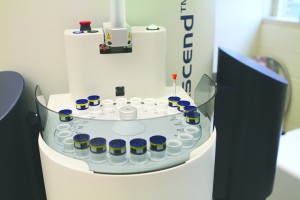
Carlye Thornton | Lariat Photo Editor
By Viola Zhou
Reporter
A new laboratory is being set up in the chemistry department to facilitate cancer drug research and spur economic development in Texas.
The chemical synthesis laboratory, which is partly funded by the Cancer Prevention Research Institute of Texas, will provide the first chemical reaction screening facility in Texas, said Dr. John Wood, professor in the department of chemistry and biochemistry.
Dr. Ke Kong, research professor and the director of this new laboratory, said about half of the $1 million cost is covered by the institute, whose mission is to attract and expand the state’s research capabilities and create high quality new jobs in Texas.
“This facility will allow us to make molecules faster and more efficiently,” Wood said. “Some of them may become tools that people may use to study cancer. Some derivatives of the molecules we make can become cancer drugs someday.”
Kong said the facility makes it easier to find out the condition under which certain compounds can be produced.
“This laboratory will contain a facility with robot-arms which can try hundreds of reaction conditions at the same time,” Kong said. “It may take one month to find out the right reaction condition with conventional methods. But with this it may only take one to two days.”
Wood said the facility will be used by graduate students and undergraduates working in the laboratories in the chemistry department. It will also be accessible to researchers in small companies and other universities in Texas.
He said the department has been contacted by some medicine chemists working at the University of Texas MD Anderson Cancer Center, a cancer treatment and research center in Houston. They are waiting for the new facility to screen some chemical reactions in progress.
Kong said work on the new laboratory started in January and is expected to be completed in November.
Wood said the grants sent to the laboratory are not only for improving cancer research but also for promoting the economic development of Texas.
“If our facility can help a small company to thrive or help other researchers in Texas do their work, that would be in line with the goals of CPRIT,” Wood said.
He said the grants from the institute cover five years of operation for the laboratory. Next year, the department will start to seek other sponsorship to support the laboratory after the grants run out.
According to the estimation by the Texas Cancer Registry, 119,115 Texans will be newly diagnosed with cancer and 44,150 will die of the disease in 2014.
Kong said the small companies in Texas will be charged low rates if they want to use the laboratory, and the university will not be making profits from their use.
Wood said facilities like that can expand cancer research in Texas and make students and scientists here capable of doing cancer research.
“Then if a company is trying to decide where to locate, if they are going to do cancer research and they want to have access to facilities and knowledge, they might locate in Texas,” he said.





